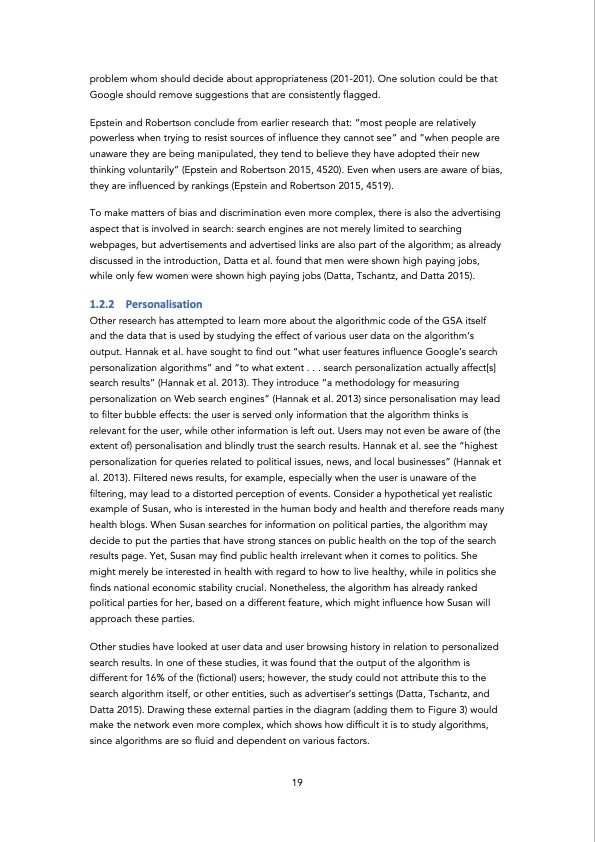
PDF Publication Title:
Text from PDF Page: 019
problem whom should decide about appropriateness (201-201). One solution could be that Google should remove suggestions that are consistently flagged. Epstein and Robertson conclude from earlier research that: “most people are relatively powerless when trying to resist sources of influence they cannot see” and “when people are unaware they are being manipulated, they tend to believe they have adopted their new thinking voluntarily” (Epstein and Robertson 2015, 4520). Even when users are aware of bias, they are influenced by rankings (Epstein and Robertson 2015, 4519). To make matters of bias and discrimination even more complex, there is also the advertising aspect that is involved in search: search engines are not merely limited to searching webpages, but advertisements and advertised links are also part of the algorithm; as already discussed in the introduction, Datta et al. found that men were shown high paying jobs, while only few women were shown high paying jobs (Datta, Tschantz, and Datta 2015). 1.2.2 Personalisation Other research has attempted to learn more about the algorithmic code of the GSA itself and the data that is used by studying the effect of various user data on the algorithm’s output. Hannak et al. have sought to find out “what user features influence Google’s search personalization algorithms” and “to what extent . . . search personalization actually affect[s] search results” (Hannak et al. 2013). They introduce “a methodology for measuring personalization on Web search engines” (Hannak et al. 2013) since personalisation may lead to filter bubble effects: the user is served only information that the algorithm thinks is relevant for the user, while other information is left out. Users may not even be aware of (the extent of) personalisation and blindly trust the search results. Hannak et al. see the “highest personalization for queries related to political issues, news, and local businesses” (Hannak et al. 2013). Filtered news results, for example, especially when the user is unaware of the filtering, may lead to a distorted perception of events. Consider a hypothetical yet realistic example of Susan, who is interested in the human body and health and therefore reads many health blogs. When Susan searches for information on political parties, the algorithm may decide to put the parties that have strong stances on public health on the top of the search results page. Yet, Susan may find public health irrelevant when it comes to politics. She might merely be interested in health with regard to how to live healthy, while in politics she finds national economic stability crucial. Nonetheless, the algorithm has already ranked political parties for her, based on a different feature, which might influence how Susan will approach these parties. Other studies have looked at user data and user browsing history in relation to personalized search results. In one of these studies, it was found that the output of the algorithm is different for 16% of the (fictional) users; however, the study could not attribute this to the search algorithm itself, or other entities, such as advertiser’s settings (Datta, Tschantz, and Datta 2015). Drawing these external parties in the diagram (adding them to Figure 3) would make the network even more complex, which shows how difficult it is to study algorithms, since algorithms are so fluid and dependent on various factors. 19PDF Image | peek into the discursive construction of the Google Search Algorithm: A critical discourse analysis

PDF Search Title:
peek into the discursive construction of the Google Search Algorithm: A critical discourse analysisOriginal File Name Searched:
thesis-google-search-algotithm.pdfDIY PDF Search: Google It | Yahoo | Bing
Cruise Ship Reviews | Luxury Resort | Jet | Yacht | and Travel Tech More Info
Cruising Review Topics and Articles More Info
Software based on Filemaker for the travel industry More Info
The Burgenstock Resort: Reviews on CruisingReview website... More Info
Resort Reviews: World Class resorts... More Info
The Riffelalp Resort: Reviews on CruisingReview website... More Info
| CONTACT TEL: 608-238-6001 Email: greg@cruisingreview.com | RSS | AMP |